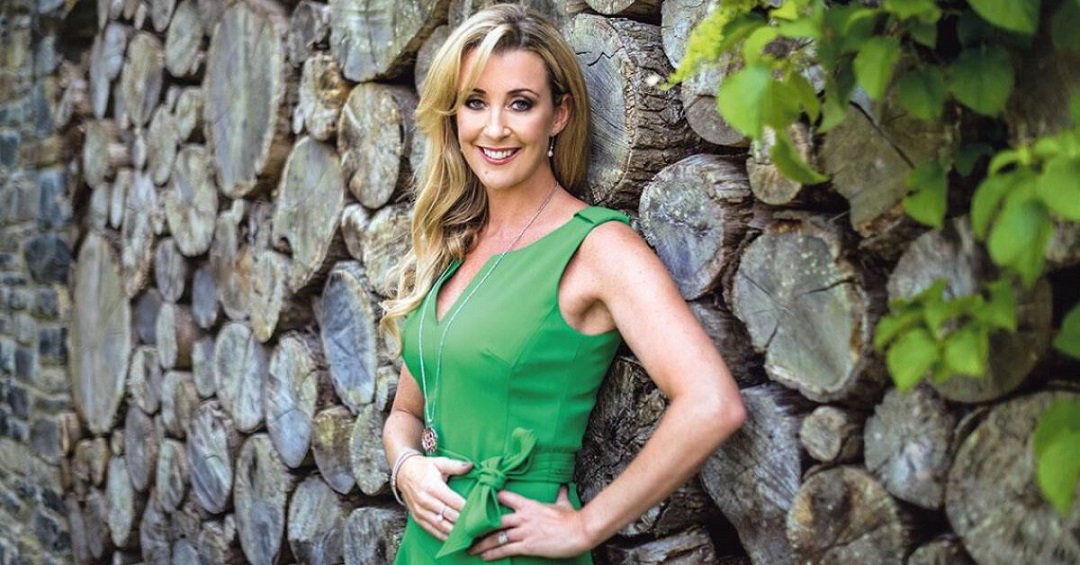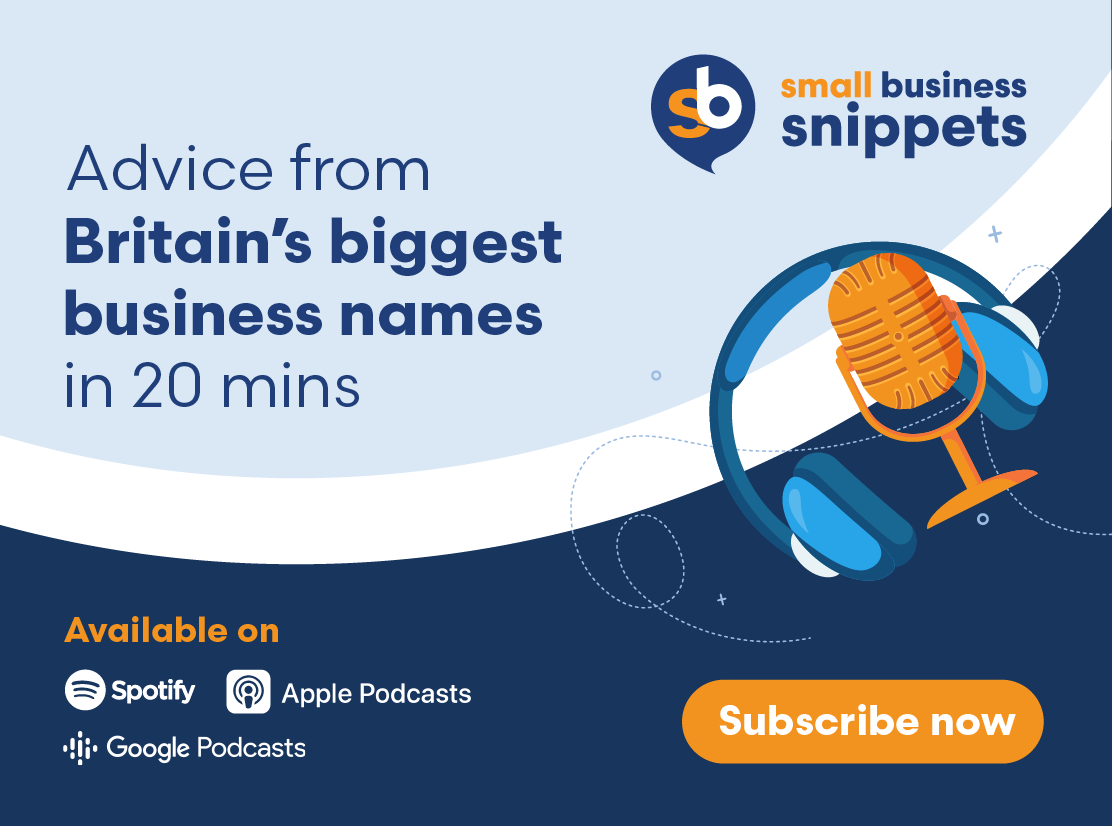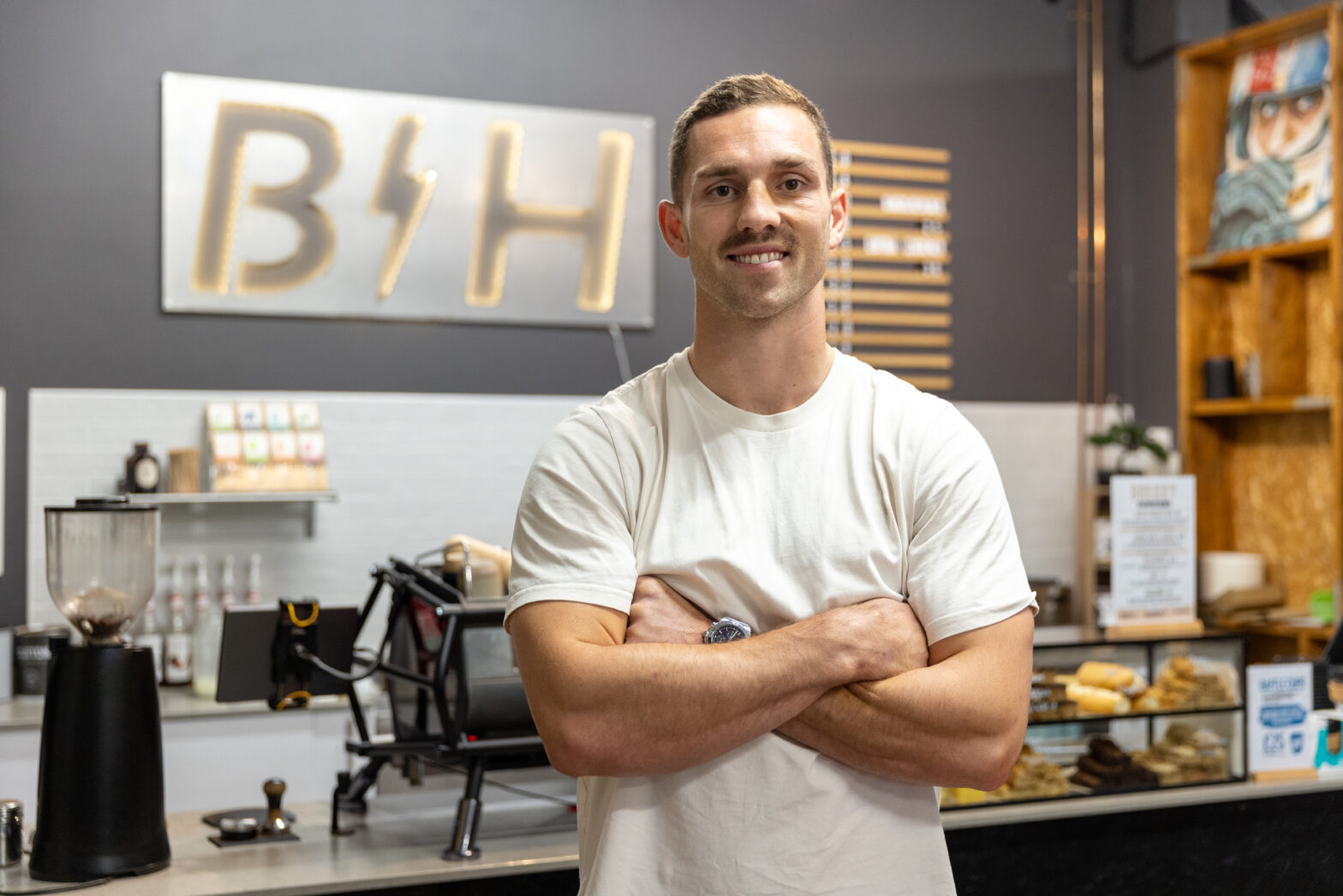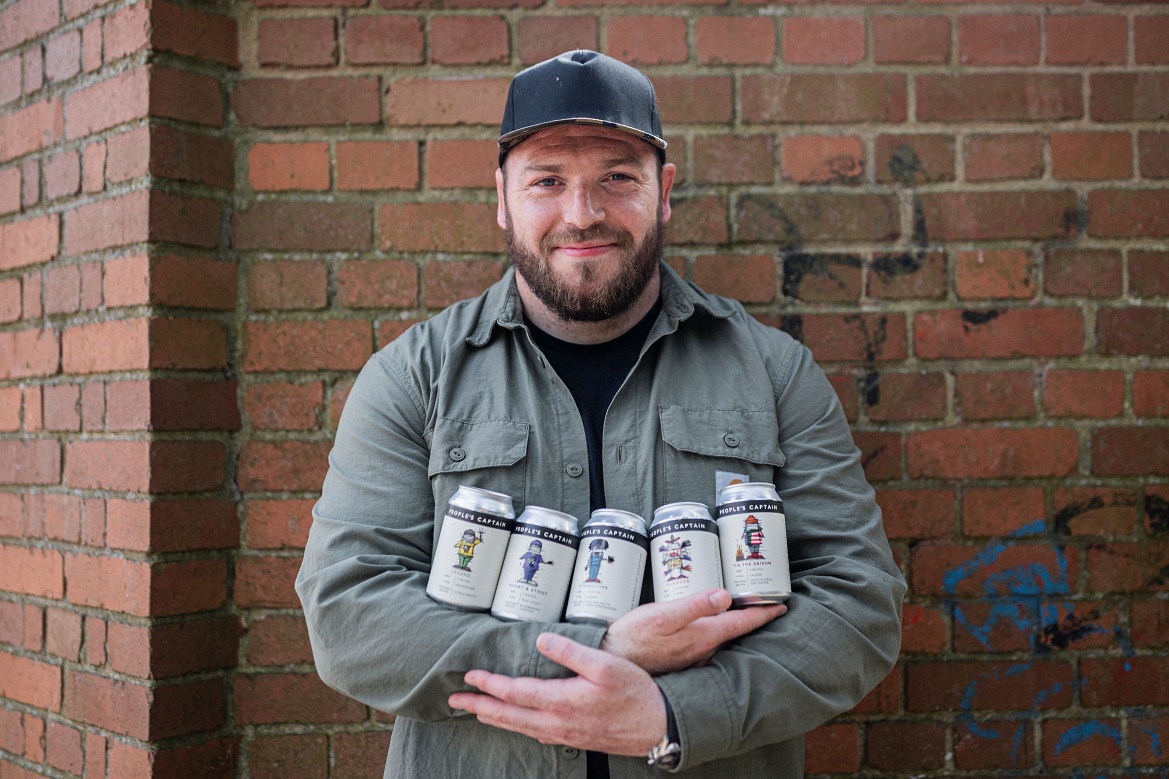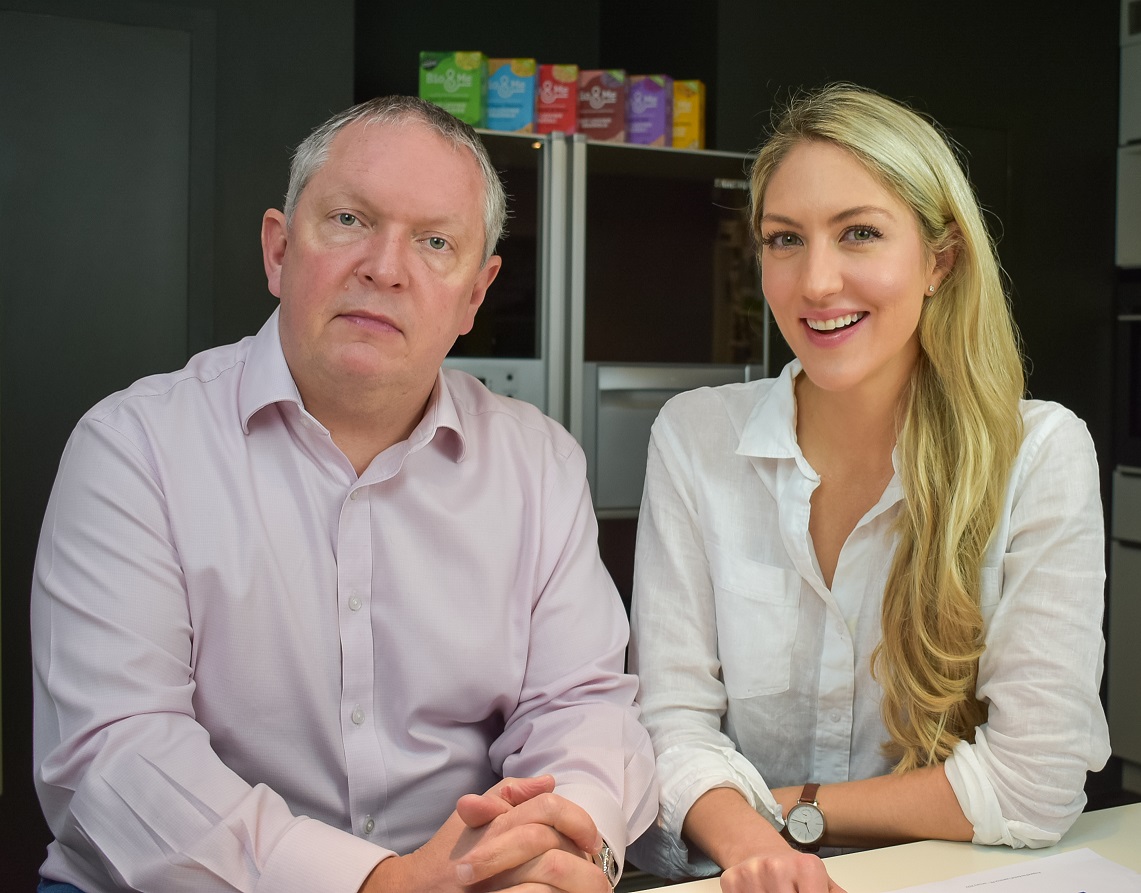Welcome to Small Business Snippets, the podcast from SmallBusiness.co.uk. Today’s guest is Lady Chanelle McCoy – entrepreneur and former Dragon on Dragons’ Den Ireland.
We talk about her time on the show as well as the barriers to growth facing the CBD industry.
Listen to it in the media player below.
Alternatively, you can watch the video here:
You can also catch our episodes with:
- Businessman and The Apprentice winner, Mark Wright
- Entrepreneur and campaigner, Paul Lindley
- Managing director of Brompton Bikes, Will Butler-Adams
- Businessman and author, Gerald Ratner
- Entrepreneur and TV presenter, Trinny Woodall
- Pub owner and bartender on Channel 4’s First Dates, Merlin Griffiths
- Founder and chairman of Pimlico (formerly Pimlico Plumbers), Charlie Mullins
- Retail expert and former Dragon, Theo Paphitis
- Author and boardroom expert, John Tusa
- Digital guru and investor, Sherry Coutu
- Entrepreneur and former Dragon, Rachel Elnaugh
- Businesswoman and Dragon, Deborah Meaden
- Entrepreneur and The Apprentice 2005 candidate, Tim Campbell
- Gousto CEO, Timo Boldt
- Entrepreneur and The Apprentice 2018 candidate, Jackie Fast
- Investor and former Dragon, Piers Linney
- Investment fund manager, Nicola Horlick
- Supermodel turned entrepreneur, Caprice
We’ve got podcast episodes from the first series looking at:
- How one business owner’s mental breakdown caused her to see trolls from her past
- How one entrepreneur hired a videographer to track their every move and build their business brand
- How funding a business led one entrepreneur to stress-related alopecia
- One entrepreneur’s first professional public speaking engagement
- Adapting to UK life and learning English before starting a business
- Securing seed funding
- Finding the perfect head of customer care
- Reaching a £1 million annual rate of return
- Boosting client numbers from 30 to 850
- Starting a brand new business from scratch
To find out more about Small Business Snippets, you can download the trailer.
If you want to listen to the podcast elsewhere, it’s available on Apple Podcasts, Google Podcasts and Spotify. Watch the new video versions and subscribe over at our YouTube channel. It’d also be great if you could leave us a review.
Remember to like us on Facebook @SmallBusinessExperts and follow us on Twitter @smallbusinessuk, all lower case.
Want to read Chanelle McCoy’s podcast interview instead?
Hello and welcome to Small Business Snippets, the podcast from SmallBusiness.co.uk. I’m your host, Anna Jordan.
Today we have Lady Chanelle McCoy, entrepreneur and former Dragon on Dragons’ Den Ireland.
Born in Galway, she co-founded Chanelle Medical, part of Chanelle Pharma, which was founded by her father. In 2015, Lady McCoy and business partner Caroline Glynn set up Chanelle McCoy Health, an R&D led pharmaceutical company. From that came cannabidiol (CBD) range, Pureis CBD.
She was recently ranked no 23 in the ‘50 incredible people shaping modern Ireland’. She was awarded the All-Ireland Business Champion Award 2018 for her outstanding achievements in business leadership.
We’ll be talking about her time on Dragons’ Den Ireland and the barriers to growth facing the CBD industry.
So, listeners and viewers might not recognise you straight away. But they might have seen you before on the Irish version of Dragons’ Den
Chanelle: Yeah, that’s right. I’m Irish, home grown – from the west of Ireland. I’ve spent over 25 years in the pharmaceutical industry. I’m very lucky to get the opportunity to do Dragons’ Den, the Irish version. Dragons’ Den is owned by Sony Music, and they franchise that out to 27 countries around the world. When I did Dragons’ Den, when I started the first year, Ireland was the first country to have three female dragons and two male dragons. It was a fantastic experience to do it. I definitely made a few investments. Yeah, so it was great.
What would you say are the biggest differences between the Irish version and the UK version? I’ve only seen a few clips of the Irish version, but for want of a better word, it seems nicer – less cut-throat, I suppose.
Chanelle: I mean, maybe that’s more of a cultural thing as us Irish are quite warm and friendly, maybe. But no, I think that the fact that Sony Music are the owners, and it’s a franchise, that the setting was very much the same, was very like this, the way we sit, and the seats and, and the whole kind of procedure of it as well. It is your own money that you’re investing, that you have to bring that to the table, even though the cash sitting beside you is actually not real.
We would record about seven pitches in a day. So you literally would have one after another, some of the pitches would go on for about an hour and a half, even though you only see maybe 15-20 minutes on the TV when it’s edited down.
The reality is you get no prior warning or visibility of the pitch that’s coming into the den. So you’re in between all this, like when the seven pitches are going on, in between that you leave the room, you go back backstage kind of thing. You wait until the room is set up, you come back onto your chair, the product is hidden, you’ve got no phone, you can’t Google anything. And it’s literally when that entrepreneur walks out of the lift that you get to know about the products. So, that’s why the pitches would go on for more like an hour and a half, because this is your money you’re investing, and you have to make a decision right there and then, whether you’re going to invest or not.
I mean, obviously maybe some people feel Ireland, the Irish was a bit tamer than England, but there were certainly a few of the pitches that we gave them a hard time with!
The fact that it’s every pitch is brand new to you. Why do you think that is? Is it more of like a production thing and gets an authentic reaction from you?
Chanelle: I think it’s twofold. I think that the entrepreneur coming in there pitching, knows that they’ve got this really short window to sell their story and their business to you. Those entrepreneurs coming in, most of them really need that investment to survive, and if they don’t get it, their company will close, they’re running out of cash, so there’s from their side of the fence, they know that we have had no prior knowledge of their of their company. So they’ve got to pitch really well, from our side as well.
That’s the whole thrill of Dragons’ Den is that it’s instinctive, you have to make a decision right there and then, so that builds to the excitement I’m kind of the drama of it or the appeal of it.
I’d like to talk a bit more about your time in the pharmaceutical industry, because it’s certainly been a year for pharmaceuticals, for CBD and for the wellness industry as well. And there’s so much to unpick with that
Starting off with CBD, the market has grown exponentially, it absolutely exploded, and it’s becoming more popular with consumers. But there are still barriers to growth. Say for example, search engines, in my understanding, are reluctant to rank products with CBD and anything related. Tell us more about the barriers to growth in that particular market
Chanelle: If we look at where we’ve come in the last six years. Today, the CBD food supplement market in the UK is valued at £450m. Now to put that into context, what does that mean – is that big, is that small? If you look at vitamin C in the UK today, that’s £115m. Vitamin D today is £145m so CBD today and we have eight million people that take CBD today in the UK. CBD today at £450m totally eclipses vitamin C and vitamin D together. But the exciting thing is that £450m figure will grow to £1bn in the next three years. We are delighted that our product, it’s called Pureis CBD, and we’re on the market over a year now in the UK and we’re in over 1,000 retailers.
We’re the first CBD food supplement company to command the UK market that’s backed by clinical studies. And we invested over a number of years, we invested over £1.5m in extensive safety clinical studies, because that is the requirement by the UK Food Standards Agency, the European Food Safety Authority, because they say CBD is a new molecule in your body. We didn’t take it prior to 1997, they want all these safety studies done. So, we just embarked on, while adhering to the legislation.
We are the first CBD food supplement company in the world to use FDA-registered raw material. And that might not mean a lot to the consumer walking in off the street, but it means a lot to the pharmacists and the doctors. Because the FDA are the strictest food and medicine sheriffs in the world. It was great that we worked with our raw material supplier, and we were able to get that certification on our raw material.
What’s happened in the CBD industry this week [week commencing April 19, 2021], which has been incredibly interesting to watch it evolve. The Food Standards Agency, which are basically the governing body that look after the safety of food supplements, they set a deadline for the CBD industry this week that any CBD food supplements that wants to stay on the market has got to submit a dossier into the Food Standards Agency with a full suite of clinical safety studies. And if you do that, you are allowed to remain on the market. If you don’t do that, you will be pulled off the market.
And the Food Standards Agency this week published a list of the companies that are allowed remain on the market. There are only three brands on that list, and we are the first brand on that list. We are officially in full assessment with the Food Standards Agency, we’re on that list, which is very exciting.
‘We still have banks, financial services and payment gateways that will not trade with CBD companies’
How many were there to begin with?
Chanelle: About 800. What will happen, as the weeks go on, there will be more companies added to that list. But if you’re not on the list by June, you’re off the market.
But this is a very positive move. The UK government trying to bring what is an unregulated CBD market into a regulated market, because this is all about consumer safety at the end of the day. And the issue with CBD is there are a lot of rogue traders and cowboys out there. That was validated by a paper that was published last year where a number of professors got together, they tested over 30 products that are on the market. The alarming results of that paper is that 55 per cent of products on the market today have illegal levels of THC. And THC is a psychoactive addictive part of the cannabis plant that you don’t want in a food supplement. It’s fine in the medicine space when it’s released by a doctor. And also, of those products, 34 per cent of them have lower levels of CBD than advertised on the label. There’s a huge issue with misleading the consumer and this is why the legislation has come in, because they want to clean up the market. So what you’ll see over the next few months is you will see a lot of CBD brands will be pulled off the market, the market will consolidate and what will be left on the market will be very safe products that are backed by clinical studies.
This will help demystify CBD and give us the really good reputation that it should have because it is not psychoactive, you do not get a high from CBD. CBD is not addictive. It’s just got all the good healing properties. So that’s in terms of a kind the market and where we are and how it’s going to grow and with the legislation.
What is really hampering the CBD industry at the moment and is really going to affect the potential growth and job opportunities in the UK, is we still have banks, financial services and payment gateways that will not trade with CBD companies. They treat us like we’re in the porn industry, they treat us like we’re illegal, so we can’t open a bank account in the UK.
We’re dealing with lots of payment providers like Stripe, the two Irish boys, we tell them all about our clinical studies, we are fully ethical, we are now on the approved government list. Computer says no, they will not support our business. You then go to the likes of Facebook, Twitter, Instagram, and you say well, we want to do some digital advertising and we want to run social media campaigns with our products. We have clinical studies here, we are very ethical. Again, computer says no, we don’t deal with CBD companies.
I think these types of institutions and these companies really need to wake up. They need to take their blinkers off and they need to think, ‘Okay, let’s assess each CBD company as they approach us. Why don’t we trade with those companies that are on the Food Standard Agency ‘Publish’ list, because we know that they are ethical, they’re safe. They’ve done their studies.’
The London Stock Exchange has floated three companies recently, three CBD companies, one of them is the one that David Beckham’s involved in. If the LSE is engaging and trading with CBD companies, well why won’t other companies?
What is the critical issue now is the Home Office. Okay, so the Home Office in the UK is the government arm that is responsible for policing narcotics and drugs here – and what’s been imported. Our raw material is manufactured in the United States. As I said, it’s FDA registered, so it’s really high quality. We are synthetically derived, so we are not taken from the plant. We have mimicked the DNA the plant, so it is not possible to have any THC in our products because we are synthetic. And the Home Office have said to us – now, this is not us, this is with every CBD company.
No, you are not allowed to import your raw material into the UK. And because we bring our raw material into the UK, and then we get our products manufactured, our finished product manufactured in the UK. They say no, because your product might have THC. So we went to four labs that the Home Office use, these are independent government-approved laboratories, we got our raw material tested, we gave them the certificates, plus all our data from the FDA and said, ‘We don’t have THC. We’re synthetic, it’s not possible.’ And again, they’re like, ‘Computer says no, sorry.’
What’s going to happen now is you’re going to see a lot of people like us leaving the UK. We get our product manufactured in the UK, we had planned with the manufacturing company we work with, that they were going to create 70 more jobs between now and the end of the year, because now we are launching a lot of different markets outside Europe and Ukraine and Russia and China. And we need lots of product manufactured.
Those 70 jobs now will not be created in the UK because we’ve got to go to Germany and Ireland to set up, to find a new manufacturing partner and set up our production there. That’s happening now, right through the CBD industry, where there will be huge job losses. They are totally suffocating the growth of what will be a huge market – not just for food supplements, but for the pharmaceutical industry as well.
So, you spoke a bit earlier about the difficulties and the resistance to the CBD market, especially in the UK. Of course, we all know that, especially since the transition period ended, Brexit has caused some troubles as well, it’ll be great to hear from somebody who is a major trading partner of the UK. So as a business based in Ireland, how has your trading relationship with the UK been affected by Brexit?
Chanelle: I mean, it’s very difficult now. And we are trading both ways, we are registered as an Irish company. And we are now registered as an English company. We get our manufacturing done in the UK of our finished product. But now, because of Brexit, we will look to have a second manufacturing site as well set up. Because when we hopefully get our European licence receipt for our products, for Pureis, we will have a lot of challenges having the product manufactured in the UK, and then shipping it to the likes of Germany and France, because customs, tariffs, duty, is crippling.
When we contact that customs and it’s like, ‘Well look, you can get your customer to pay it, and then your customer in Germany can claim it back.’ It is it is annoying for a customer to have to do that. And if they have an alternative to trade with somebody that’s in a European country over you, they will do that, because they don’t have that administration hassle when they’re dealing with somebody else. It is very unfortunate that there is not a better trade deal between the UK and Europe. Also then bringing product in from Ireland into the UK, is very difficult. So what it has forced companies like myself to do is that when you’re trading in Europe, you need to have a base in Europe. You need to move your manufacturing from the UK and position it in Europe, that is really the only way. When you’re trading in the UK, what you need to do is set up a manufacturing facility in the UK to service your UK customers.
That is a pity, because it has incurred a lot of costs for us we’re trying to set up work with new partners, qualify them as a manufacturer for our product in Europe and also what it does is we now, for our European customers, we are now taking all our production out of the UK and basing it in Europe.
The UK have lost out a lot. But no matter what way you look at it, upside down, inside out, that is really the only way because at the end of the day, this is about servicing your customer. It’s about being easy to deal with in the eyes of your customer. And it’s about not incurring costs in terms of extra customs and duty and taxes and all of that. So that’s really the way we’ve navigated it, but I think if the UK had the chance again to vote to leave Europe, I certainly don’t think they would. I’ve spoken to so many UK entrepreneurs, Irish entrepreneurs and our leaders, and they tell you that.
So it wouldn’t be the case where the UK is a significant enough market where the costs would be worth it on balance
Chanelle: I mean, what it just means now is that, if you want to trade with the UK, you want to supply product into the UK, you’re better off to source it within the UK. And the UK might think, well, that’s a good thing, because we’re bringing more employment and more opportunity into the UK, because we’re forcing people to set up to partner with manufacturers in the UK. But actually, your loss is much bigger, because Europe is much bigger geographically. And what you’re missing out on, is companies like me, who want to service 28 countries in Europe, from a manufacturing facility in the UK, and we can’t do it.
We’ve spoken a little bit about your husband, AP McCoy. I noticed that in quite a lot of the bios and the introductions I read about yourself, that he’s mentioned within that bio and is quite a significant part of it. And I wondered how that affects you. As you’re a self-named brand, do you feel that your husband’s presence and career kind of helps boost it? Or do you feel that you can’t exist in your own right?
Chanelle: I’m incredibly proud of AP and to go through his career, and to be the most successful winning jockey, and to be champion jockey for 20 years, and winning the BBC Sports Personality of the Year and be knighted by the Queen – it’s a great legacy. It’s a great achievement within what he has done. And he’s been incredibly impactful to me. As I went along in my career, I was lucky – I met him when I was 19. I’m 44 now. We’ve done this journey together, where I’ve worked for my family business, while he was scaling the heights in his career. I suppose it was a great outlet for me, because, I had to work really hard, it wasn’t like that I kind of floated through my job and I dipped out to go racing every week, it wasn’t that case.
I was very mindful of the fact that during that period, in our twenties and early thirties, that it was all about AP. Every time I went to the races, or you’re out to dinner with people, everybody wants to talk about him. And that’s okay, because it’s incredibly dangerous what he does, it’s very interesting when you get under the hood of like, the diet and the people he rides for, and all of that. I was very happy to go along, for like, 15-20 years, where people would always ask me about him.
But I think, what was really where I benefited hugely, and it goes back to the environment you live in, you work in. His dedication, his will to win, his absolute resilience, definitely rubbed off on me and shaped my culture, shaped my values. He motivated me. That’s why in the workplace, it’s so important, as a leader, as a manager, that you are creating this environment, where you are inspiring, you’re positive, you’re giving people that self-belief because your behaviour as a leader totally rubs off on the people around you, and will become their behaviour – they will emulate that. He was a fantastic source of inspiration for me, because his behaviour kind of became my behaviour in the end.
It was only really, when he stopped riding in 2015 and I started to do Dragons’ Den, that people used to say to me, ‘You’re on Dragons’ Den, Chanelle? I mean, I didn’t even know you had a job. I’ve seen you for years at the races.’ And I’m like, ‘Yeah, yeah. I’m in pharmaceuticals, have been in here for 15 years.’ So suddenly people started to say to me, ‘Oh, you’re not just AP’s wife then?’ ‘No, no – I’m a human in my own right.’
As AP said to me, ‘Chanelle, it’s your time to shine’. I’ve been in his shadow, very happily in his shadow and supporting him, so he’s incredibly supportive when I did Dragons’ Den, and now with my own business, and trailblazing in the CBD industry, because we’re the first with our clinical studies. We’re the first to get on this list, the government list that was published this week. He’s very supportive and very proud. He’s been a massive help to me over the years and has definitely been the driving force.
You can find out more about Lady Chanelle McCoy at chanellemccoyhealth.com. You can also visit smallbusiness.co.uk for more podcasts featuring Dragons from the UK version of Dragon’s Den. Remember to like us on Facebook @SmallBusinessExperts, follow us on Twitter @smallbusinessuk (all lowercase) and subscribe to our YouTube channel, linked in the description.
